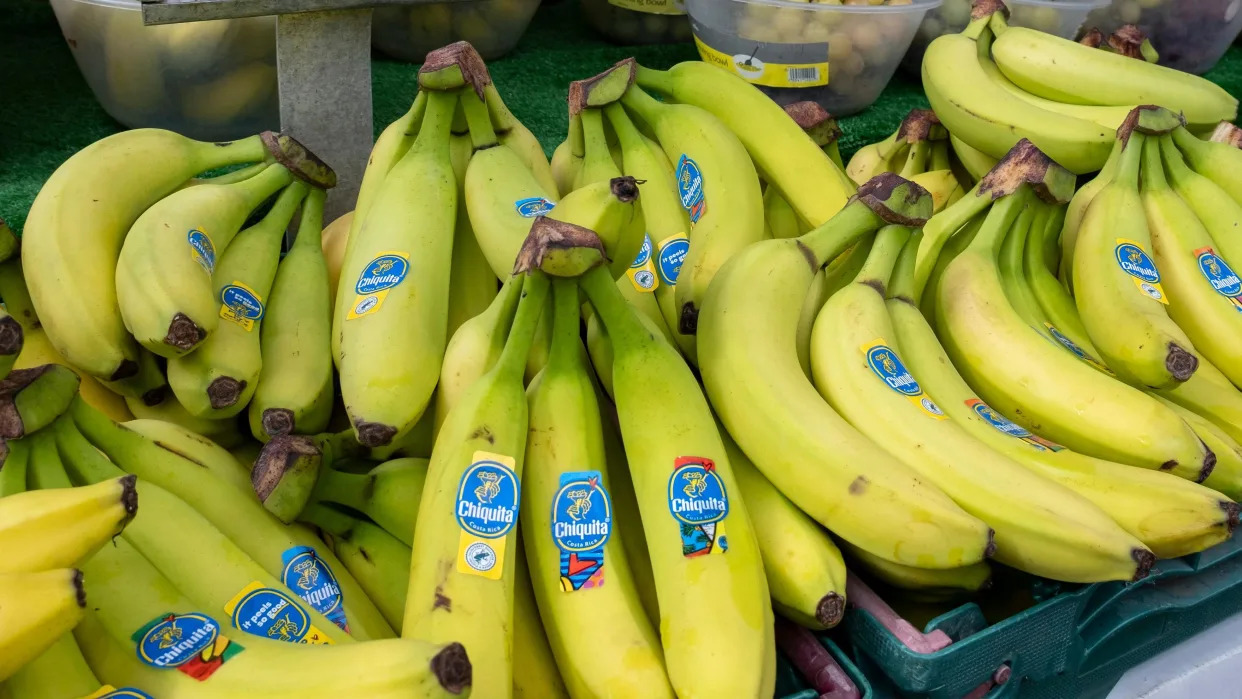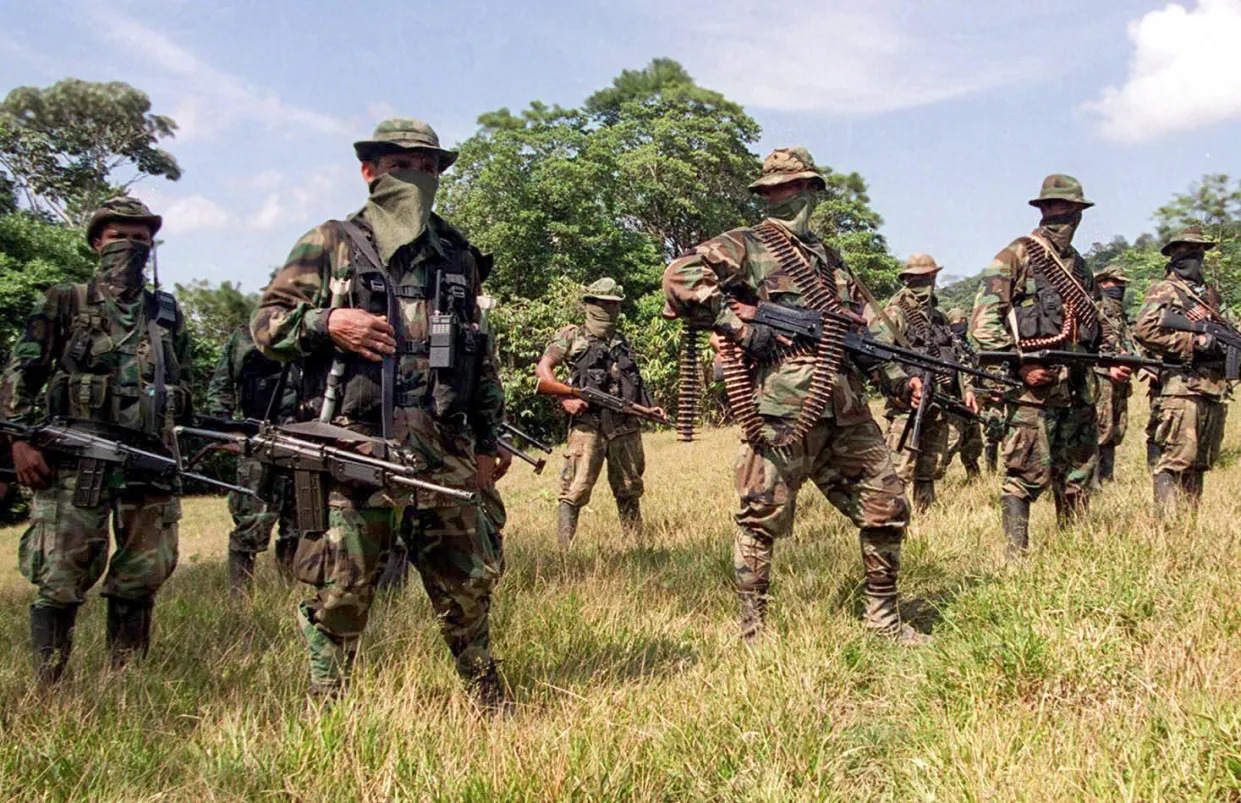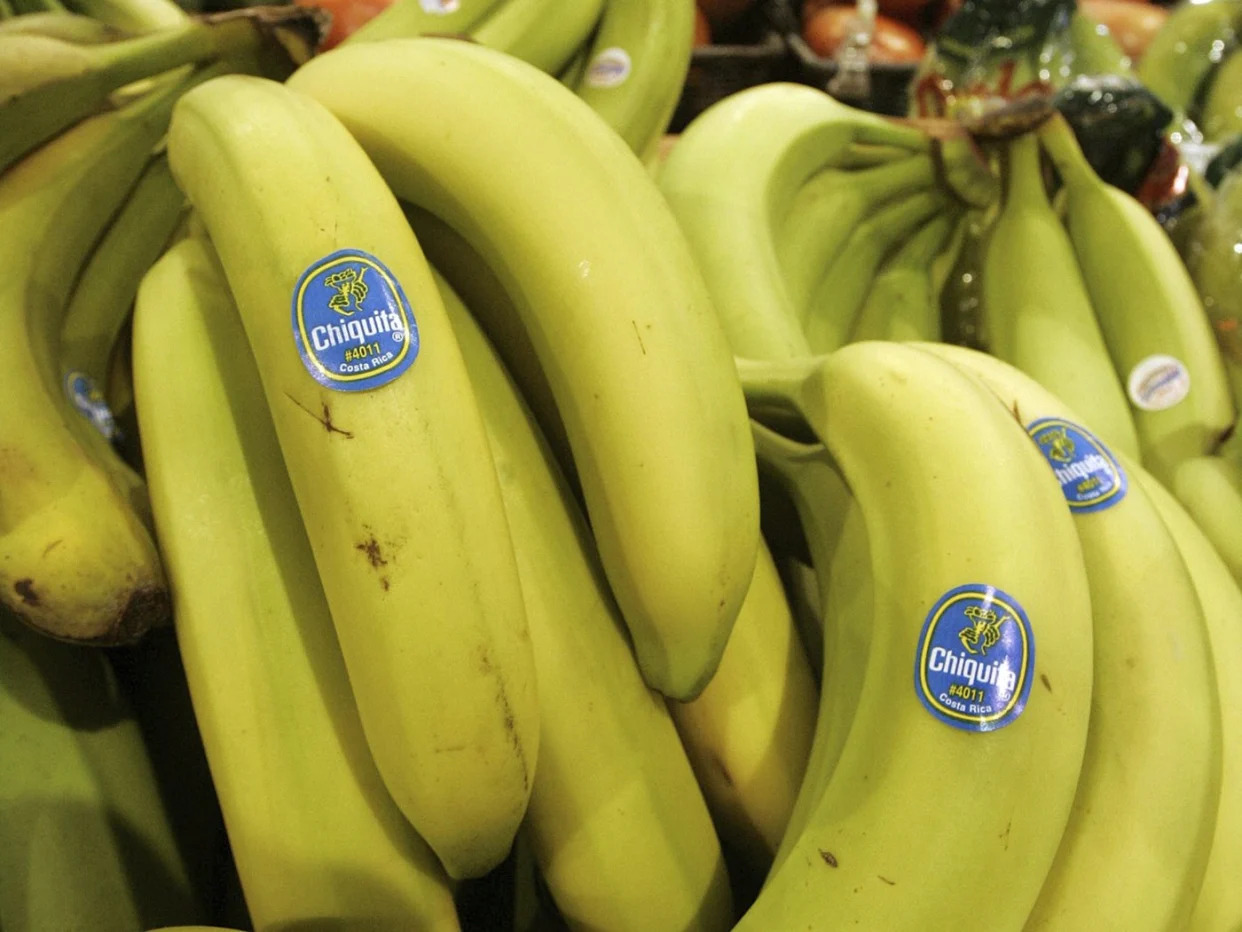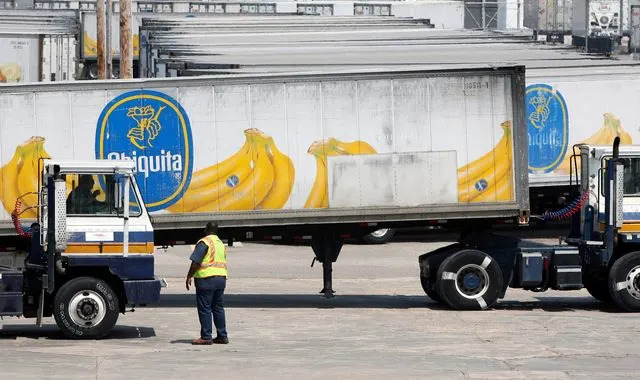Vanessa Buschschlüter - BBC News
Tue, June 11, 2024

[Getty Images]
A court in the United States has found multinational fruit company Chiquita Brands International liable for financing a Colombian paramilitary group.
The group, the United Self-Defence Forces of Colombia (AUC), was designated by the US as a terrorist organisation at the time.
Following a civil case brought by eight Colombian families whose relatives were killed by the AUC, Chiquita has been ordered to pay $38.3m (£30m) in damages to the families.
Chiquita said in a statement that it intended to appeal against the jury's verdict, arguing that there was "no legal basis for the claims".
The jury in the case, which was heard in a federal court in South Florida, found Chiquita responsible for the wrongful deaths of eight men killed by the AUC.
The AUC engaged in widespread human rights abuses in Colombia, including murdering people it suspected of links with left-wing rebels.
The victims ranged from trade unionists to banana workers.
The case was brought by the families after Chiquita pleaded guilty in 2007 to making payments to the AUC.
During the 2007 trial, it was revealed that Chiquita had made payments amounting to more than $1.7m to the AUC in the six years from 1997 to 2004.
The banana giant said that it began making the payments after the leader of the AUC at the time, Carlos Castaño, implied that staff and property belonging to Chiquita's subsidiary in Colombia could be harmed if the money was not forthcoming.
Lawyers for Chiquita argued that the company had no choice but to pay the AUC to protect its Colombian employees from violence.
But the plaintiffs argued that the company formed "an unholy alliance with the AUC" at a time when Chiquita was expanding its presence in regions controlled by the AUC.
The regular payments continued even after the AUC was designated by the US as a foreign terrorist organisation in 2001.
While the AUC claimed to have been created to defend landowners from attacks and extortion attempts by left-wing rebels, the paramilitary group more often acted as a death squad for drug traffickers.
At its height, it had an estimated 30,000 members who engaged in intimidation, drug trafficking, extortion, forced displacement and killings.
It also launched brutal attacks on villagers they suspected of supporting left-wing rebels.
The group demobilised in 2006 after reaching a peace deal with the government, but some of its members went on to form new splinter groups which continue to be active.
The class-action lawsuit against Chiquita which ended on Monday focussed on nine cases, which were chosen out of hundreds of claims against the banana company.
The jury found that the AUC was responsible for eight of the nine murders examined as part of the lawsuit.
The jury also ruled that Chiquita had knowingly provided substantial assistance to the AUC, to a degree sufficient to create a foreseeable risk of harm.
Chiquita said in a statement released after the verdict that the situation in Colombia was "tragic for so many, including those directly affected by the violence there, and our thoughts remain with them and their families".
"However, that does not change our belief that there is no legal basis for these claims," it added.
The company said it remained confident that its legal position would ultimately prevail.
Agnieszka Fryszman, one of the leading lawyers for the plaintiffs, meanwhile praised the families she represented, saying that they had "risked their lives to come forward to hold Chiquita to account, putting their faith in the United States justice system".
She added that "the verdict does not bring back the husbands and sons who were killed, but it sets the record straight and places accountability for funding terrorism where it belongs: at Chiquita's doorstep".
Another lawyer for the Colombian families, Leslie Kroeger, said that “after a long 17 years against a well-funded defence, justice was finally served”.
A second case against Chiquita brought by another group of plaintiffs is due to start on 15 July.
US banana giant ordered to pay $38m to families of Colombian men killed by death squads
Luke Taylor in Bogotá
THE GUARDIAN
Tue, June 11, 2024

Paramilitary troops of the Colombian United Self-Defense Forces (AUC) train in the mountains near Catatumbo, in Colombia on 29 January 2000.Photograph: Carlos Garcia/AFP via Getty Images
A Florida court has ordered Chiquita Brands International to pay $38m to the families of eight Colombian men murdered by a paramilitary death squad, after the American banana giant was shown to have financed the terrorist organisation from 1997-2004.
The landmark ruling late on Monday came after 17 years of legal efforts and is the first time that the fruit multinational has paid out compensation to Colombian victims, opening the way for thousands of others to seek restitution.
Related: Warlord behind 1,500 murders returns to Colombia after 12-year sentence in US
It also marks the first time a major US corporation has been held liable for such rights abuses in another country and could lead to a series of similar lawsuits involving rights violations across the world.
“This verdict sends a powerful message to corporations everywhere: profiting from human rights abuses will not go unpunished,” said Marco Simons at EarthRights, one of the law firms representing the families of those killed by the paramilitaries.
Chiquita pleaded guilty in 2007 to funding “a specially designated global terrorist” for secretly paying the United Self-Defence Forces of Colombia (AUC) $1.7m over seven years at the height of Colombia’s brutal conflict, but had never before been ordered to pay compensation to victims.
The rightwing AUC sprang up in the 1980s to protect landowners from leftist rebels such as the Revolutionary Armed Forces of Colombia (Farc), but went on to become the worst perpetrators of human rights violations in the south American nation – and one of the country’s largest drug-traffickers.
Until it disarmed as part of a 2004 peace process, the AUC was responsible for most of the civilian lives lost in Colombia’s brutal, six-decade-long conflict, which left 450,000 people dead and millions displaced.
Chiquita has argued that it was extorted by the AUC and that the payments were necessary to protect its employees from armed Marxists.
Court documents show that Chiquita continued paying the AUC after it had been designated an international terrorist organisation in the US in 2001 and that executives saw the payment as the “cost of doing business in Colombia”.
Related: Colombian elite backed death squads, former paramilitary commander says
New evidence presented to the Florida courts also showed that Chiquita allowed the AUC to use its ports to import automatic rifles and its banana boats to smuggle cocaine across the seas, human rights lawyers at International Rights Advocates (IRAdvocates) said.
The civil cases were brought by the family members of trade unionists, banana workers and activists who were tortured, killed and disappeared by paramilitaries as they sought to control the vast banana-producing regions of Colombia.
Some victims were forcibly disappeared by the AUC merely for being suspected of sympathising with the rebels, the rights firms said.
Among the victims who presented evidence was the widow of a union leader who was tortured, decapitated and dismembered by the AUC in 1997.
“It’s a triumph of a process that has been going on for almost 17 years, for all of us who have suffered so much during these years,” said another of the victims, who asked not to be named. “We’re not in this process because we want to be. It was Chiquita, with its actions, that dragged us into it. We have a responsibility to our families, and we must fight for them.”
The case was a “bellwether trial”, said Terrence Collingsworth, executive director of IRAdvocates, one of the legal firms representing the victims.
If the other pending cases are not resolved by negotiation, a second bellwether trial is scheduled for 14 July.
“These brave women and the other Plaintiffs in this case have demonstrated that corporate criminals like Chiquita can be held accountable through courage and perseverance. Hopefully, this verdict will inspire others to fight for corporate accountability,” Collingsworth said in a statement. “In my experience, corporations operating in the global economy will do whatever they can get away with. We just showed them that there are real consequences for corporate outlaws.”
Florida jury finds Chiquita Brands liable for Colombia deaths, must pay $38.3M to family members
Tue, June 11, 2024

Paramilitary troops of the Colombian United Self-Defense Forces (AUC) train in the mountains near Catatumbo, in Colombia on 29 January 2000.Photograph: Carlos Garcia/AFP via Getty Images
A Florida court has ordered Chiquita Brands International to pay $38m to the families of eight Colombian men murdered by a paramilitary death squad, after the American banana giant was shown to have financed the terrorist organisation from 1997-2004.
The landmark ruling late on Monday came after 17 years of legal efforts and is the first time that the fruit multinational has paid out compensation to Colombian victims, opening the way for thousands of others to seek restitution.
Related: Warlord behind 1,500 murders returns to Colombia after 12-year sentence in US
It also marks the first time a major US corporation has been held liable for such rights abuses in another country and could lead to a series of similar lawsuits involving rights violations across the world.
“This verdict sends a powerful message to corporations everywhere: profiting from human rights abuses will not go unpunished,” said Marco Simons at EarthRights, one of the law firms representing the families of those killed by the paramilitaries.
Chiquita pleaded guilty in 2007 to funding “a specially designated global terrorist” for secretly paying the United Self-Defence Forces of Colombia (AUC) $1.7m over seven years at the height of Colombia’s brutal conflict, but had never before been ordered to pay compensation to victims.
The rightwing AUC sprang up in the 1980s to protect landowners from leftist rebels such as the Revolutionary Armed Forces of Colombia (Farc), but went on to become the worst perpetrators of human rights violations in the south American nation – and one of the country’s largest drug-traffickers.
Until it disarmed as part of a 2004 peace process, the AUC was responsible for most of the civilian lives lost in Colombia’s brutal, six-decade-long conflict, which left 450,000 people dead and millions displaced.
Chiquita has argued that it was extorted by the AUC and that the payments were necessary to protect its employees from armed Marxists.
Court documents show that Chiquita continued paying the AUC after it had been designated an international terrorist organisation in the US in 2001 and that executives saw the payment as the “cost of doing business in Colombia”.
Related: Colombian elite backed death squads, former paramilitary commander says
New evidence presented to the Florida courts also showed that Chiquita allowed the AUC to use its ports to import automatic rifles and its banana boats to smuggle cocaine across the seas, human rights lawyers at International Rights Advocates (IRAdvocates) said.
The civil cases were brought by the family members of trade unionists, banana workers and activists who were tortured, killed and disappeared by paramilitaries as they sought to control the vast banana-producing regions of Colombia.
Some victims were forcibly disappeared by the AUC merely for being suspected of sympathising with the rebels, the rights firms said.
Among the victims who presented evidence was the widow of a union leader who was tortured, decapitated and dismembered by the AUC in 1997.
“It’s a triumph of a process that has been going on for almost 17 years, for all of us who have suffered so much during these years,” said another of the victims, who asked not to be named. “We’re not in this process because we want to be. It was Chiquita, with its actions, that dragged us into it. We have a responsibility to our families, and we must fight for them.”
The case was a “bellwether trial”, said Terrence Collingsworth, executive director of IRAdvocates, one of the legal firms representing the victims.
If the other pending cases are not resolved by negotiation, a second bellwether trial is scheduled for 14 July.
“These brave women and the other Plaintiffs in this case have demonstrated that corporate criminals like Chiquita can be held accountable through courage and perseverance. Hopefully, this verdict will inspire others to fight for corporate accountability,” Collingsworth said in a statement. “In my experience, corporations operating in the global economy will do whatever they can get away with. We just showed them that there are real consequences for corporate outlaws.”
Florida jury finds Chiquita Brands liable for Colombia deaths, must pay $38.3M to family members
Curt Anderson
Tue, June 11, 2024

Banana giant Chiquita Brands must pay $38.3 million to 16 family members of people killed during Colombia's long civil war by a violent right-wing paramilitary group funded by the company, a federal jury in Florida decided.
The verdict Monday by a jury in West Palm Beach marks the first time the company has been found liable in any of multiple similar lawsuits pending elsewhere in U.S. courts, lawyers for the plaintiffs said. It also marks a rare finding that blames a private U.S. company for human rights abuses in other countries.
“This verdict sends a powerful message to corporations everywhere: profiting from human rights abuses will not go unpunished. These families, victimized by armed groups and corporations, asserted their power and prevailed in the judicial process,” Marco Simons, EarthRights International General Counsel and one plaintiff's lawyer, said in a news release.
“The situation in Colombia was tragic for so many,” Chiquita, whose banana operations are based in Florida, said in a statement after the verdict. “However, that does not change our belief that there is no legal basis for these claims.”
According to court documents, Chiquita paid the United Self-Defense Forces of Colombia — known by its Spanish acronym AUC — about $1.7 million between 1997 and 2004. The AUC is blamed for the killings of thousands of people during those years.
Chiquita has insisted that its Colombia subsidiary, Banadex, only made the payments out of fear that AUC would harm its employees and operations, court records show.
Reacting to the ruling on social media, Colombian president Gustavo Petro questioned why the U.S. justice system could “determine” Chiquita financed paramilitary groups, while judges in Colombia have not ruled against the company.
“The 2016 peace deal … calls for the creation of a tribunal that will disclose judicial truths, why don’t we have one?” Petro posted on X, referencing the year the civil conflict ended.
The verdict followed a six-week trial and two days of deliberations. The EarthRights case was originally filed in July 2007 and was combined with several other lawsuits.
“Our clients risked their lives to come forward to hold Chiquita to account, putting their faith in the United States justice system. I am very grateful to the jury for the time and care they took to evaluate the evidence,” said Agnieszka Fryszman, another attorney in the case. “The verdict does not bring back the husbands and sons who were killed, but it sets the record straight and places accountability for funding terrorism where it belongs: at Chiquita’s doorstep.”
In 2007, Chiquita pleaded guilty to a U.S. criminal charge of engaging in transactions with a foreign terrorist organization — the AUC was designated such a group by the State Department in 2001 — and agreed to pay a $25 million fine. The company was also required to implement a compliance and ethics program, according to the Justice Department.
Curt Anderson, The Associated Press
Major US banana firm Chiquita Brands ordered to pay $38m to victims of Colombian terror group it funded
Sky News
Tue, June 11, 2024

Banana firm Chiquita Brands has been ordered to pay $38.3m (£30m) to 16 family members of people killed by a right-wing paramilitary group it funded during Colombia's long civil war.
The decision by a federal jury in Florida marks the first time the company has been found liable in any of a number of similar lawsuits pending elsewhere in the US.
It also marks a rare finding that blames a private US company for human rights abuses in other countries.
"This verdict sends a powerful message to corporations everywhere: profiting from human rights abuses will not go unpunished," Marco Simons, EarthRights international general counsel and one plaintiff's lawyer, said in a statement.
"These families, victimised by armed groups and corporations, asserted their power and prevailed in the judicial process."
"The situation in Colombia was tragic for so many," Chiquita, whose banana operations are based in Florida, said in a statement after the verdict.
"However, that does not change our belief that there is no legal basis for these claims."
According to court documents, Chiquita paid the United Self-Defense Forces of Colombia - known by its Spanish acronym AUC - about $1.7m (£1.3m) between 1997 and 2004.
The AUC is blamed for the killings of thousands of people during those years.
Chiquita has insisted its Colombia subsidiary, Banadex, only made the payments out of fear that AUC would harm its employees and operations, according to court records.
Reacting to the ruling on social media, Colombian President Gustavo Petro questioned why the US justice system could "determine" Chiquita financed paramilitary groups, while judges in Colombia have not ruled against the company.
"The 2016 peace deal… calls for the creation of a tribunal that will disclose judicial truths, why don't we have one?" Mr Petro posted on X, referencing the year the civil conflict ended.
The verdict followed a six-week trial and two days of deliberations.
The EarthRights case was originally filed in July 2007 and was combined with several other lawsuits.
In 2007, Chiquita pleaded guilty to a US criminal charge of engaging in transactions with a foreign terrorist organisation - a designation given to the AUC in 2001 - and agreed to pay a $25m (£19.6m) fine.
Chiquita found liable for funding Colombian right-wing terrorist group
David Matthews, New York Daily News
Tue, June 11, 2024

A federal jury in Florida has found Chiquita liable for funding a Colombian terrorist group and must pay millions to the families of victims.
Autodefensas Unidas de Colombia, a right-wing paramilitary group that operated during the country’s civil war, disbanded in 2006 but not before it was deemed a terrorist organization by the United States.
The lawsuit, which was originally filed in 2008, said payments from the multinational fruit company allowed the group to operate. Among the group’s human rights abuses was the killing of people believed to support left-wing rebels.
The families of eight men who were killed by the group filed a lawsuit against Chiquita, arguing its funding of the group made it responsible for the deaths. The South Florida jury agreed and ordered them to pay their families $38.3 million dollars.
“This verdict sends a powerful message to corporations everywhere: profiting from human rights abuses will not go unpunished. These families, victimized by armed groups and corporations, asserted their power and prevailed in the judicial process,” said Marco Simons, general counsel at EarthRights International and one plaintiff’s lawyer.
Chiquita had previously pleaded guilty to making $1.7 million in “security services” payments to the AUC between 1997 and 2004, despite its status as a terrorist organization, and agreed to pay a $25 million fine, the Justice Department said.
The company claimed it only made the payments because it was extorted by the AUC and feared for its workers’ safety.
Chiquita said it plans to appeal the verdict.
_________
No comments:
Post a Comment